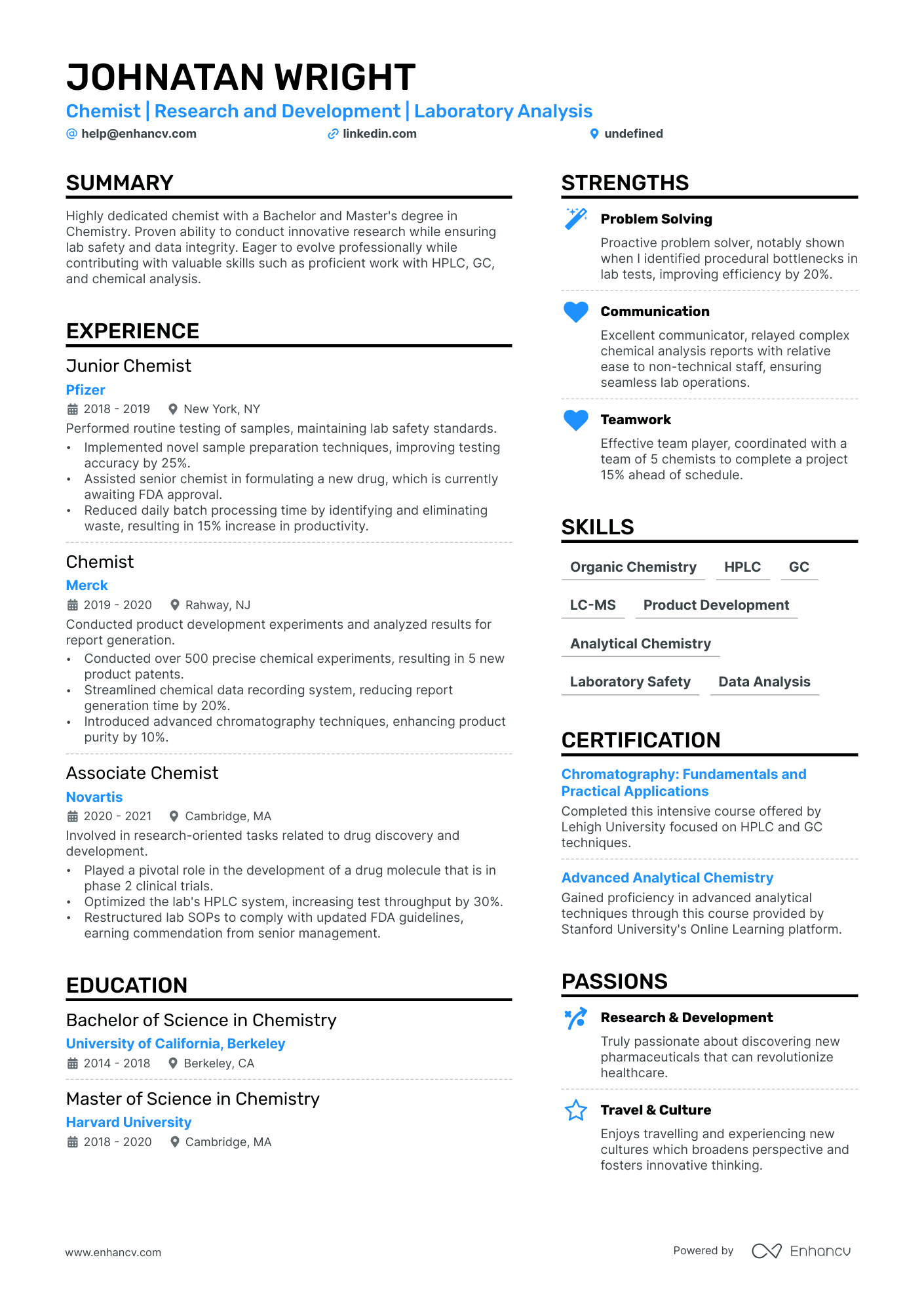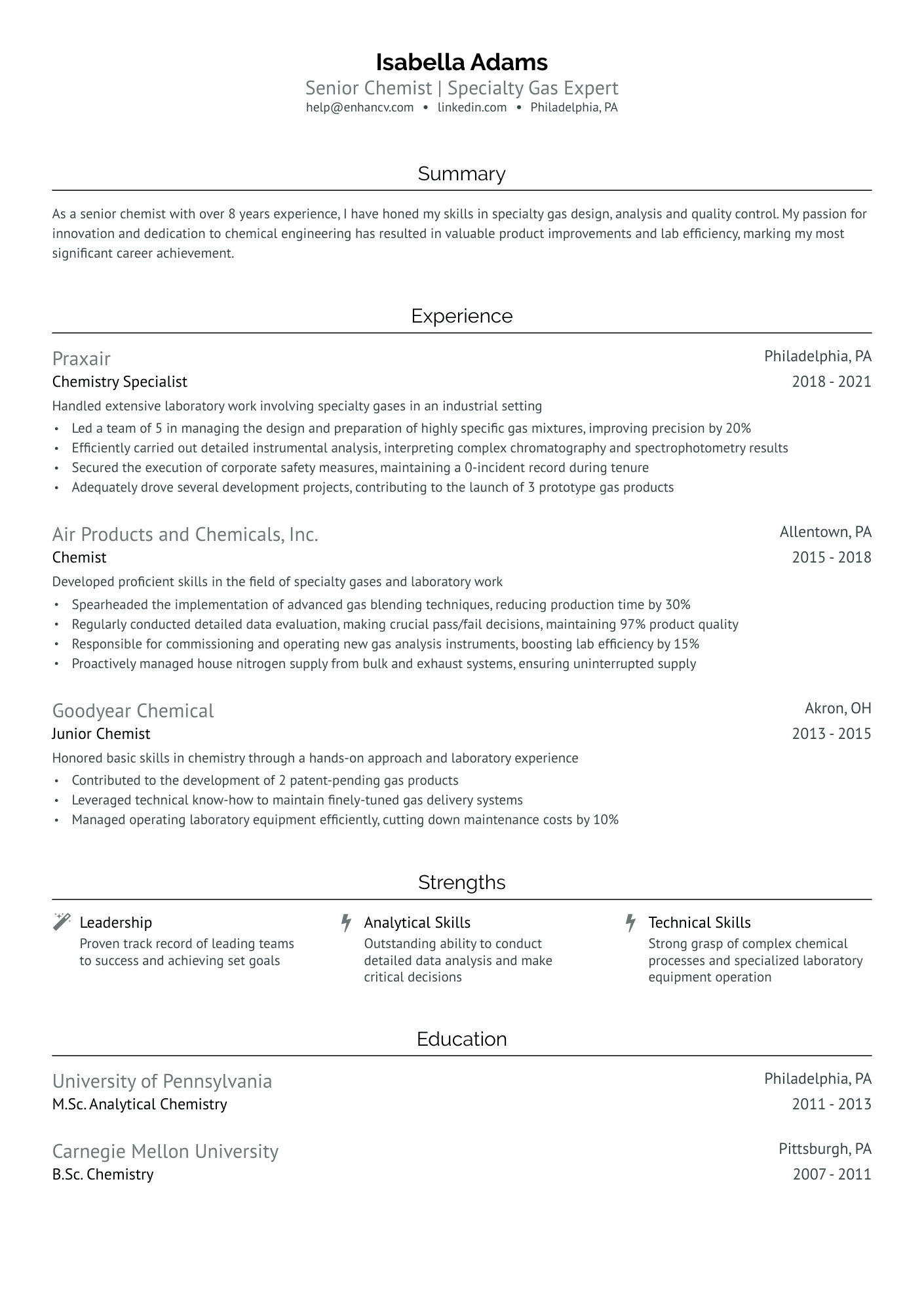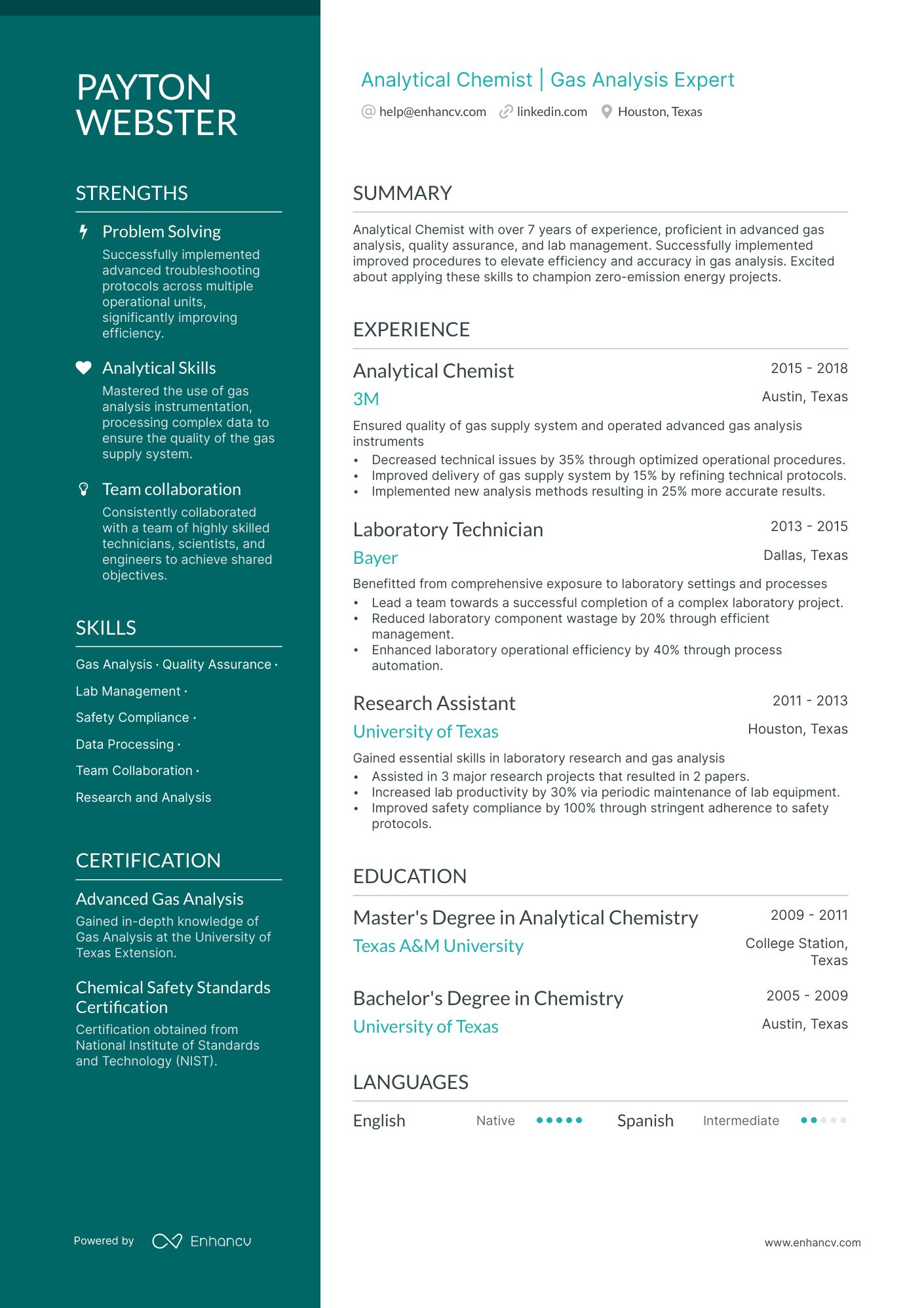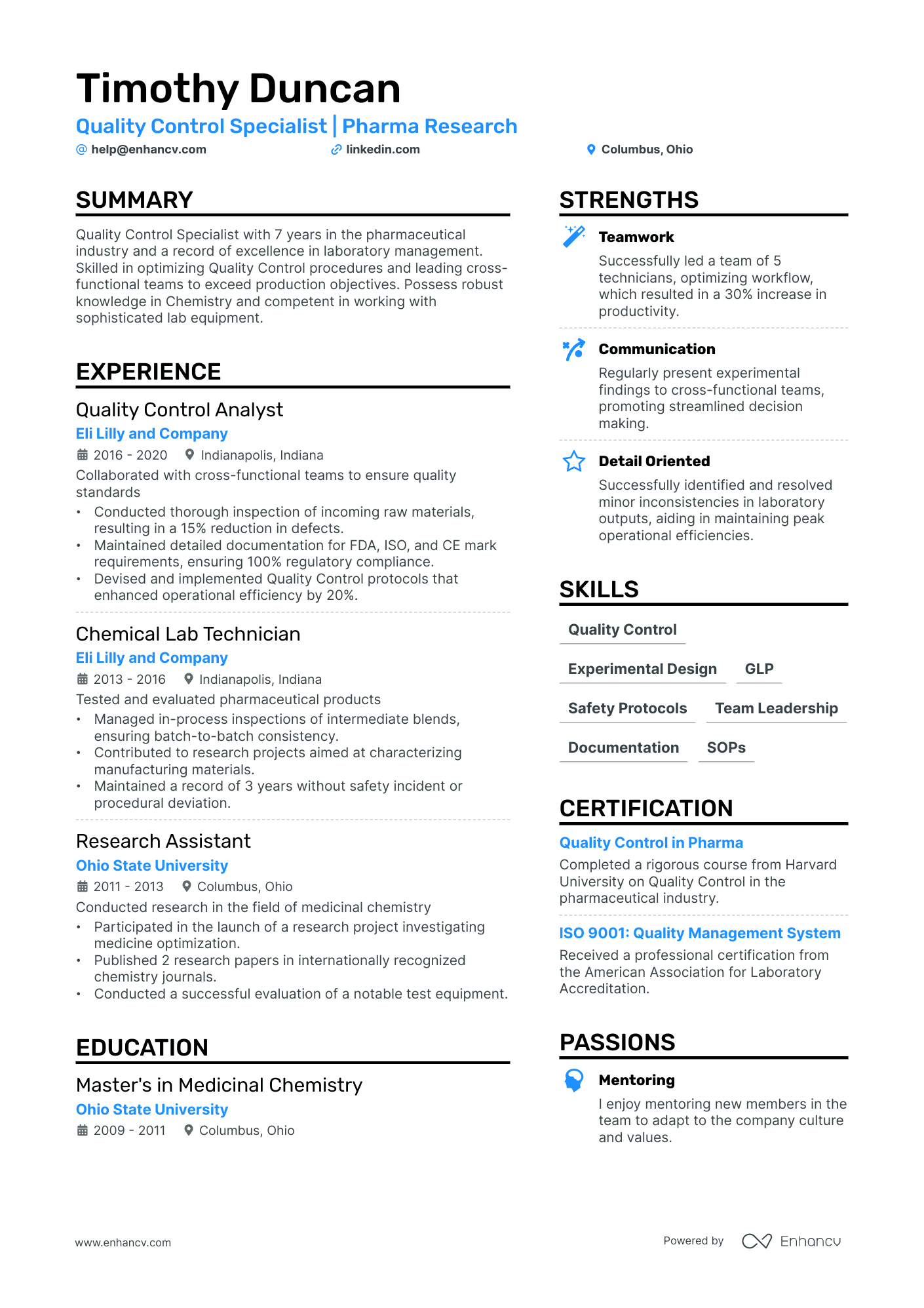As a chemist, encapsulating the breadth of your technical expertise without overwhelming non-specialist hiring managers can be challenging. Our guide provides tailored strategies to elegantly distill complex scientific skills into compelling, accessible resume content that resonates with diverse audiences.
- Which sections do you need to include in your resume to meet recruiters' requirements;
- How to write your chemist resume experience section - even if you have don't have little to no work experience;
- Real-life professional examples to guide you how to write the most important chemist resume sections;
- Adding even more sections so your chemist resume stands out with professionalism and your personality.
We've also selected some of the best (and most relevant) resume guides for the chemist role you're applying for:
- Lab Assistant Resume Example
- Lab Manager Resume Example
- Research Manager Resume Example
- Radiologic Technologist Resume Example
- Researcher Resume Example
- Scientist Resume Example
- Research Assistant Resume Example
- Research Director Resume Example
- Research Associate Resume Example
- Lab Technician Resume Example
The ultimate formula for your chemist resume format
Our best advice on how to style your chemist resume is this - first, take the time to study the job advert requirements.
The resume format you select should ultimately help you better align how your experience matches the specific role.
There are four crucial elements you need to thus take into consideration:
- How you present your experience. If you happen to have plenty of relevant expertise, select the reverse-chronological resume format to organize your experience by dates, starting with the latest.
- Don't go over the top with writing your resume. Instead, stick with a maximum of two-page format to feature what matters most about your profile.
- Headers aren't just for "decoration". The header of your resume helps recruiters allocate your contact details, portfolio, and so much more.
- The PDF format rules. It's the most common practice to submit your chemist resume as a PDF so that your resume doesn't lose its layout. However, make sure the read the job well - in some instances, they might require a doc file.
Upload & Check Your Resume
Drop your resume here or choose a file. PDF & DOCX only. Max 2MB file size.
PRO TIP
Always remember that your chemist certifications can be quantified across different resume sections, like your experience, summary, or objective. For example, you could include concise details within the expertise bullets of how the specific certificate has improved your on-the-job performance.
The six in-demand sections for your chemist resume:
- Top one-third should be filled with a header, listing your contact details, and with a summary or objective, briefly highlighting your professional accolades
- Experience section, detailing how particular jobs have helped your professional growth
- Notable achievements that tie in your hard or soft skills with tangible outcomes
- Popular industry certificates to further highlight your technical knowledge or people capabilities
- Education to showcase your academic background in the field
What recruiters want to see on your resume:
- Demonstrated experience with analytical techniques (e.g., HPLC, GC-MS, NMR, IR spectroscopy, etc.)
- Proficiency in chemical synthesis, purification, and characterization methods
- Strong background in organic, inorganic, or physical chemistry, depending on the specialization required
- Experience in designing and implementing experiments and interpreting data
- Knowledge of industry-specific regulatory standards such as GLP (Good Laboratory Practice) or GMP (Good Manufacturing Practices)
Guide to your most impressive chemist resume experience section
When it comes to your resume experience , stick to these simple, yet effective five steps:
- Show how your experience is relevant by including your responsibility, skill used, and outcome/-s;
- Use individual bullets to answer how your experience aligns with the job requirements;
- Think of a way to demonstrate the tangible results of your success with stats, numbers, and/or percentages ;
- Always tailor the experience section to the chemist role you're applying for - this may sometimes include taking out irrelevant experience items;
- Highlight your best (and most relevant) achievements towards the top of each experience bullet.
You're not alone if you're struggling with curating your experience section. That's why we've prepared some professional, real-life chemist resume samples to show how to best write your experience section (and more).
- Developed and optimized analytical methods using HPLC and GC-MS for small molecule pharmaceuticals, achieving a 30% increase in screening throughput.
- Collaborated cross-functionally with the research and development team to bring two new drug candidates to pre-clinical trial stages, expediting the timeline by 4 months.
- Managed a quality control lab, ensuring 100% compliance with FDA regulations and maintaining a record of zero non-conformances for two consecutive years.
- Spearheaded a project to develop a new synthetic route for a key API, reducing production costs by 20% and cutting waste by 40%.
- Led a team of junior chemists, providing mentorship and technical training, which improved team productivity by 25%.
- Authored multiple successful grant proposals, securing over $500,000 in funding for innovative research into green chemistry practices.
- Implemented a new titration method for acidity determination in raw materials, which improved accuracy by 15% and reduced test time by 50%.
- Conducted stability studies for new product formulations, ensuring a 95% product shelf-life accuracy over a 2-year period.
- Trained over 20 laboratory technicians in proper analytical techniques and safety protocols, resulting in a 98% pass rate on internal proficiency tests.
- Developed a new colorimetric assay for the quantification of a novel biomarker in blood samples, which was adopted by three leading hospitals.
- Established an SOP for the chemical laboratory that enhanced procedural efficiency by integrating lean management principles.
- Presented findings at international chemistry conferences, receiving accolades for innovative approaches to biochemical challenges.
- Improved product quality by optimizing the polymerization process for high-density polyethylene, increasing tensile strength by 10%.
- Reduced raw material waste by 5% annually by modifying the chemical feedstock blending procedures.
- Authored 3 peer-reviewed publications on chemical process improvements, establishing the company as a thought leader in the field.
- Oversaw the transition to a new spectrometric analysis platform, which increased sample throughput by 35% and improved detection limits for trace elements.
- Successfully scaled up a laboratory formulation to production scale, producing over 10,000 liters without any drop in quality standards.
- Coordinated with regulatory bodies to ensure that all new chemical entities were registered and compliant with both domestic and international chemical inventory requirements.
- Managed a portfolio of analytical projects for environmental samples, resulting in the timely and accurate reporting of data to state and federal agencies.
- Designed and executed a laboratory-wide equipment calibration program, which maintained instrument precision within 0.1% tolerance levels.
- Contributed to inter-departmental efforts to reduce turnaround time for high-priority projects, slashing average delivery times by 20% through process optimization.
- Directed continuous improvement initiatives for the synthesis of fine chemicals, achieving a 15% increase in yield while maintaining product purity.
- Acted as the principal investigator in a multi-year study on catalysis, resulting in the development of a novel catalyst system that increased reaction efficiency by 25%.
- Secured a patent for an innovative chemical process, which is expected to generate a new revenue stream projected at $1 million annually.
The following content includes information from "O*NET OnLine" by the U.S. Department of Labor, Employment and Training Administration (USDOL/ETA). Used under the CC BY 4.0 license. The data represents the top responsibilities present on the task lists for chemist professionals.
Top Responsibilities for Chemist:
- Develop, improve, or customize products, equipment, formulas, processes, or analytical methods.
- Analyze organic or inorganic compounds to determine chemical or physical properties, composition, structure, relationships, or reactions, using chromatography, spectroscopy, or spectrophotometry techniques.
- Induce changes in composition of substances by introducing heat, light, energy, or chemical catalysts for quantitative or qualitative analysis.
- Conduct quality control tests.
- Write technical papers or reports or prepare standards and specifications for processes, facilities, products, or tests.
- Maintain laboratory instruments to ensure proper working order and troubleshoot malfunctions when needed.
- Prepare test solutions, compounds, or reagents for laboratory personnel to conduct tests.
- Confer with scientists or engineers to conduct analyses of research projects, interpret test results, or develop nonstandard tests.
- Evaluate laboratory safety procedures to ensure compliance with standards or to make improvements as needed.
- Direct, coordinate, or advise personnel in test procedures for analyzing components or physical properties of materials.
Quantifying impact on your resume
- Highlight the number of successful experiments you have conducted, demonstrating your reliability and the volume of work you can manage.
- Specify the percentage of cost savings achieved through process optimization or waste reduction to show your contribution to profitability.
- Include the number of publications or studies you have authored or co-authored to indicate your expertise and peer recognition.
- Mention the number of patents you hold or contributed to, revealing your innovative approach and potential commercial impact.
- List the precise number of team members you've supervised or mentored, establishing your leadership and team-building abilities.
- Detail the volume of materials or chemicals you frequently handle to showcase your competency with large-scale or commercial operations.
- Provide the percentage increase in laboratory efficiency or productivity due to improvements you've implemented, showcasing efficiency gains.
- Indicate the number of regulatory audits you have passed or compliance projects led, proving your thorough understanding of industry standards.
Action verbs for your chemist resume
Four quick steps for candidates with no resume experience
Those with less or no relevant experience could also make a good impression on recruiters by:
- Taking the time to actually understand what matters most to the role and featuring this within key sections of their resume
- Investing resume space into defining what makes them a valuable candidate with transferrable skills and personality
- Using the resume objective to showcase their personal vision for growth within the company
- Heavily featuring their technical alignment with relevant certifications, education, and skills.
Remember that your resume is about aligning your profile to that of the ideal candidate.
The more prominently you can demonstrate how you answer job requirements, the more likely you'd be called in for an interview.
Recommended reads:
PRO TIP
If you're in the process of obtaining your certificate or degree, list the expected date you're supposed to graduate or be certified.
Chemist skills and achievements section: must-have hard and soft skills
A key principle for your chemist resume is to prominently feature your hard skills, or the technologies you excel in, within the skills section. Aim to list several hard skills that are in line with the job's requirements.
When it comes to soft skills, like interpersonal communication abilities and talents, they're trickier to quantify.
Claiming to be a good communicator is one thing, but how can you substantiate this claim?
Consider creating a dedicated "Strengths" or "Achievements" section. Here, you can describe how specific soft skills (such as leadership, negotiation, problem-solving) have led to concrete achievements.
Your chemist resume should reflect a balanced combination of both hard and soft skills, just as job requirements often do.
Top skills for your chemist resume:
Chromatography
Spectroscopy
Mass Spectrometry
Chemical Synthesis
Analytical Chemistry Techniques
Laboratory Equipment Proficiency
Data Analysis Software
Chemical Safety Protocols
Titration Techniques
Electrochemistry
Critical Thinking
Problem Solving
Attention to Detail
Communication Skills
Team Collaboration
Time Management
Adaptability
Creativity
Organizational Skills
Project Management
Next, you will find information on the top technologies for chemist professonals from "O*NET OnLine" by the U.S. Department of Labor, Employment and Training Administration (USDOL/ETA). Used under the CC BY 4.0 license.
Top technologies for Chemist’s resume:
- Microsoft Access
- Structured query language SQL
- Apple iWork Keynote
- Microsoft PowerPoint
- Minitab
- Waters Empower Chromatography Data Software
PRO TIP
The more time and effort you've put into obtaining the relevant certificate, the closer to the top it should be listed. This is especially important for more senior roles and if the company you're applying for is more forward-facing.
Listing your education and certifications on your chemist resume
Don't underestimate the importance of your resume education section . As it may hint at various skills (and experience) that are relevant to the job. When writing your education section:
- Include only higher education degrees with information about the institution and start/end dates
- If you're in the process of obtaining your degree, include your expected graduation date
- Consider leaving off degrees that aren't relevant to the job or industry
- Write a description of your education if it presents you with an opportunity to further showcase your achievements in a more research-focused environment
When describing your certifications on your resume, always consider their relevancy to the role. Use the same format to describe them as you would for your education. If you're wondering what the best certificates out there are for chemist roles, check out the list below.
The top 5 certifications for your chemist resume:
- Certified Chemical Hygiene Officer (CCHO) - National Registry of Certified chemists
- Certified Professional chemist (CPC) - American Institute of chemists
- Certification as a Diplomate of the American Board of Clinical chemistry (DABCC) - American Board of Clinical chemistry
- Certification in chemistry (CChem) - Royal Society of chemistry
- Certified Forensic Consultant (CFC) - American College of Forensic Examiners Institute
The content below includes information from "O*NET OnLine" by the U.S. Department of Labor, Employment and Training Administration (USDOL/ETA). Used under the CC BY 4.0 license. The data represents the top associations for chemist professionals.
Top US associations for a Chemist professional
- American Association for the Advancement of Science
- American Association of Pharmaceutical Scientists
- American Chemical Society
- American Composites Manufacturers Association
- American Institute of Chemical Engineers
PRO TIP
If you happen to have plenty of certificates, select the ones that are most applicable and sought-after across the industry. Organize them by relevance to the role you're applying for.
Recommended reads:
Practical guide to your chemist resume summary or objective
First off, should you include a summary or objective on your chemist resume?
We definitely recommend you choose the:
- Resume summary to match job requirements with most noteworthy accomplishments.
- Resume objective as a snapshot of career dreams
Both the resume summary and objective should set expectations for recruiters as to what your career highlights are.
These introductory paragraphs (that are no more than five sentences long) should help you answer why you're the best candidate for the job.
Industry-wide best practices pinpoint that the chemist resume summaries and objectives follow the structures of these samples:
Resume summaries for a chemist job
- With a decade of experience in pharmaceutical chemistry, I've honed my expertise in organic synthesis and drug design, leading to the successful development of a novel antiviral medication that underwent clinical trials, showcasing my dedication to advancing medical treatment options.
- Transitioning from bioengineering to chemistry, I bring four years of experience in biomaterials and a keen understanding of chemical processes. My work on a patented biodegradable polymer was a career highlight that drives my desire to further innovate within chemical research.
- Experienced analytical chemist with over 15 years in the petrochemical industry, skilled in spectrometry and chromatography, having improved product quality which resulted in a 30% reduction in downstream processing errors and enhanced overall safety protocols.
- As a former environmental scientist transitioning into chemistry, I have a strong background in toxicology and a 5-year track record for implementing successful waste reduction initiatives, which resulted in a 40% decrease in hazardous waste, informing my holistic approach to chemical research and sustainability.
- Seeking to leverage a strong foundation in chemistry principles coupled with intensive laboratory coursework. Eager to apply my educational background to gain practical experience and contribute to innovative research projects that align with technological advancements in chemistry.
- Highly motivated individual with a recent degree in chemistry, aiming to utilize my in-depth knowledge of analytical techniques and modern laboratory practices. Keen on joining a dynamic team to develop my practical skills while tackling challenging projects that make significant contributions to the field of chemistry.
Average salary info by state in the US for Chemist professionals
Local salary info for Chemist.” Source: My Next Move, National Center for O*NET Development. Accessed 10/15/2024
| State | Average Salary (in USD) |
|---|---|
| US National Average | $84,680 |
| California (CA) | $97,210 |
| Texas (TX) | $95,440 |
| Florida (FL) | $81,190 |
| New York (NY) | $83,440 |
| Pennsylvania (PA) | $75,700 |
| Illinois (IL) | $82,970 |
| Ohio (OH) | $82,070 |
| Georgia (GA) | $91,260 |
| North Carolina (NC) | $79,450 |
| Michigan (MI) | $89,980 |
Bonus sections for your chemist resume
Looking to show more personality on your chemist resume? Then consider including a couple of extra sections.
They'd benefit your application by highlighting your most prominent:
Key takeaways
Writing your chemist resume can be a structured and simple experience, once you better understand the organization's requirements for the role you're applying to. To sum up, we'd like to remind you to:
- Always select which experiences, skills, and achievements to feature on your resume based on relevancy to the role;
- In your resume summary, ensure you've cherry-picked your top achievements and matched them with the job ad's skills;
- Submit your chemist resume as a one or two-page long document at the most, in a PDF format;
- Select industry leading certifications and list your higher education to highlight you have the basis for technical know-how;
- Quantify your people's skills through various resume sections (e.g. Strengths, Hobbies and interests, etc.) to show recruiters how your profile aligns with the organizational culture.





